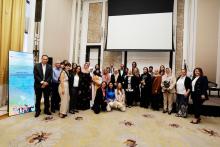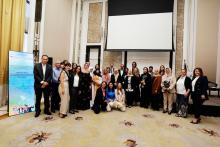Around the world, persistent conflict is exacerbating social and gender inequalities and is hindering the progress of countries struggling to recover from the fallout of COVID-19. The Middle East and North Africa (MENA) region is among those experiencing the most severe and persistent impacts, with humanitarian crises continuing to proliferate, disrupting the prosperity and wellbeing of communities. This, paired with the outbreak of new humanitarian emergencies, including in Afghanistan and Ukraine, adds to the urgency of advancing women’s meaningful participation in peacebuilding and sheds light on the important role they play in fostering lasting peace.
Women’s meaningful participation in peace processes builds lasting peace
Though women are among those most impacted by conflict, they are also most likely to remain excluded from participating in peace negotiations. This is despite cumulative evidence showing that when women are included, peace agreements are more likely to be reached, peacebuilding initiatives are more responsive to community needs, and peace is more sustainable.
Women peacebuilders worldwide, including in the MENA region, have been working to ensure the work that women are doing in mediation and conflict prevention spaces is visible, and that women’s participation is achieved at all levels and in all spaces—from civil society to politics to mediation and beyond.
Uniting women political leaders in Syria
Nada Aswad, founder and director of the Syrian organization Smile of Hope for Development and member of the Syrian Women Advisory Board (WAB), has been advocating for the participation of women in political and peace talks in Syria all her life. Through her experience and work on the ground, including as a member of WAB, she is committed to bringing together women political leaders with different views to discuss and iron out differences that would hinder the progress of the wider peace talks. “It is important that female political leaders from different parties come together to discuss and reach consensus on specific policies, so that they can keep focusing on the bigger picture and goal—namely, to build peace together,” she says.
Nada is also looking to promote women’s participation in peace processes beyond Syria and has been calling on the international community to allow everyone to join in the peace conversation, especially women and young people. “We need the political participation of women as they are the ones who bring our needs and demands to the table and make sure they are discussed and addressed,” she says. “Women are the only ones who can provide solutions for our problems.”
Training women mediators in Libya
Suzan Hemmi is the General Coordinator of the Libyan Network for Supporting and Empowering Women and oversees the Women’s Support Unit at the High National Elections Commission. For more than seven years, her organization has worked to support the training of women mediators in the country and across the MENA region. She advocates for the right of women to be at the peace table and to occupy positions of power. “Although today’s Libya has some female representation in government, the percentage is as low as 16 per cent. I strongly believe more women are needed,” Suzan says. “When women are trained in mediation, it is a way for them to conquer powerful positions and help reach peace. Women are capable of achieving extraordinary results when we are at the table.”
Fighting women’s under-representation in leadership in Iraq
Amal Kabashi, executive director at Iraq’s Women’s Network, has been working for decades to protect women’s rights. She was among those who successfully advocated for the inclusion and participation of Iraqi women in the creation of the constitution, in peacebuilding and in the democratic transformation of the country. To make this possible, she had to overcome many challenges, including constant threats from armed groups and a sociopolitical context where the rights of women were progressively shrinking. “Despite the many efforts from women’s civil society organizations over the years to sensitize communities on the importance of upholding women’s rights, today there is still dwindling support for women’s movements. This is a reflection of the persistent lack of women representatives in senior leadership positions and government: while there is a quota system that guarantees a formal 25 per cent female representation in parliament, women are still excluded from decision-making spaces,” Amal says. “We need to ensure women’s ideas are present in decision-making forums and in the board room. It is essential that women with different credos and visions all sit at the table to ensure a variety of voices are heard and integrated.”
Global Convening on Women, Peace and Security: Geneva, November 2022
Under the programme “Enhancing Women’s Leadership for Sustainable Peace in Fragile Contexts in the Middle East and North Africa (MENA) Region”—funded by the German Federal Ministry for Economic Cooperation and Development (BMZ) in cooperation with Deutsche Gesellschaft für Internationale Zusammenarbeit (GIZ) GmbH—UN Women will organize a global convening in Geneva, Switzerland between 15–17 November 2022. Entitled “Women’s Leadership for Sustainable Peace”, the convening will bring together women peacebuilders and peace activists from around the world, with a focus on the MENA region and Afghanistan. It will be an opportunity for information sharing and reflection, building on recent and ongoing discussions held at similar convenings, including the outreach event “Strengthening Women’s Participation and Influence in Peace Processes in the MENA Region”, held on29 June 2022, in Amman, Jordan.

